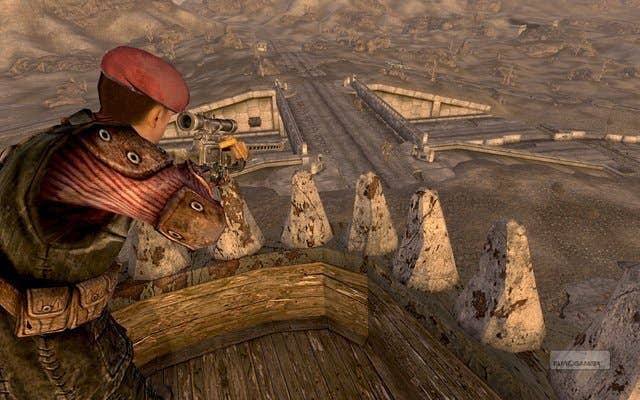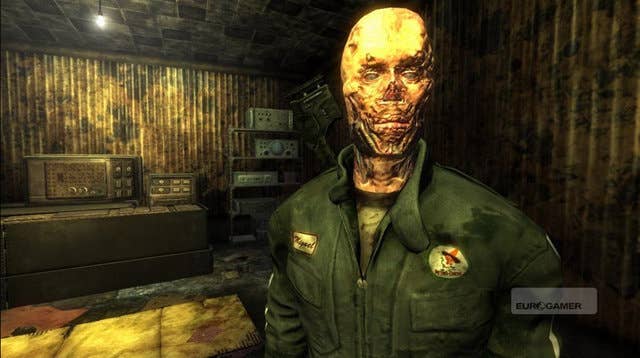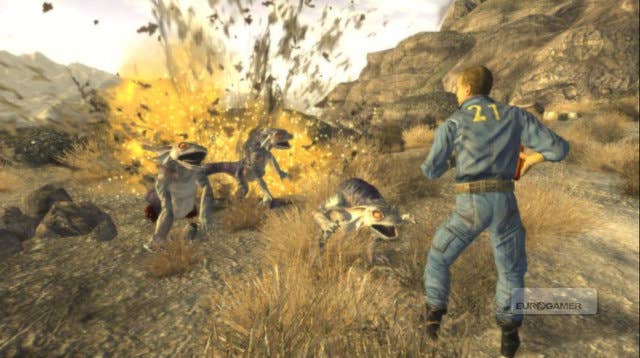Critical Consensus: Fallout New Vegas
Bethesda take a gamble with Obsidian, but was it right to bet on black?
When Bethesda rebooted the Fallout series two years ago, it managed to overcome almost all of the naysayers who said that the great series should either be left to lie dormant or given a sequel which was more true to the game's roots than a 3D action RPG.
A 93 per cent Metacritic rating and tremendous sales figures firmly established the game as a modern classic, but when it was announced that sequel-specialist Obsidian Entertainment would be handling the half sequel, half expansion New Vegas, some tutted that the reboot was doomed to mundanity as Obsidian plugged out a faithful but uninspiring fourth game.
Today is embargo day for the Obsidian Fallout acid test, and the pessimists have happily been largely proven wrong. Here, GamesIndustry.biz takes a look at the critical responses from some of the best sites around the net to see how New Vegas has fared.
Joystiq's Justin McElroy opens his discussion by pointing out how hard it is to review a game like New Vegas – and makes clear that what follows is an assessment of the experience, rather than just the product. The game's technical problems are a grind, he says, but not so much as to put off anyone who enjoyed Fallout 3.
"How could I hope to evaluate the worth of Fallout: New Vegas, a full-price game that's practically identical, both graphically and mechanically, to another game that was released two years ago? How could I tell you whether or not it's an insult that you're being asked to pay $60 for a game that's so technically deficient that it scarcely feels past the beta stage?
"Luckily, we're talking about the experience, and that's easy enough. If you loved Fallout 3, you're going to love this. If you hated it or weren't interested enough to give it a shot, you're going to be more confused than ever what all the fuss is about."

McElroy is clearly a fan of the series, and comes across as having enjoyed New Vegas a great deal in his 3.5/5 review, but expresses some concerns about how much Obsidian has actually done to differentiate the two games.
"Most of Obsidian's other additions to what Bethesda's turned out with Fallout 3 are more cosmetic. Sure, New Vegas allows you to harvest plants to use as stat-boosting chems, upgrade your weapons, and quickly give partners commands via the 'companion wheel.' They're all neat, but aren't really compelling enough to alter the way I played the game. There are certainly more tweaks than your standard expansion, but nowhere near what you'd expect from a traditional sequel. Fallout: New Vegas is neither, so perhaps it makes sense that it would fall somewhere in the middle. "
Eurogamer's Dan Whitehead is more emphatic, awarding 9/10 in a review full of praise for the game's atmosphere and incidental storytelling.
"Better still are the odd little vignettes and ambient stories written into the landscape. There's nothing more amusing than creeping into a derelict hotel room only to discover that some previous occupant has left a teddy bear and toy dinosaur arranged with some kitchen implements to create a Toytown knife fight," he writes.
Whitehead obviously feels that Obsidian has had more impact on the series' progression that McElroy gives it credit for, too – lauding the way that the developer has deepened several aspects of the experience.
"There's more going than just reshuffled assets, though. Obsidian has reintroduced more RPG features, such as crafting. You could make a small selection of weapons in the last game, but that's changed now. You can still create some explosive devices at workbenches, but mostly you'll be putting together your own stimpacks and medical supplies. Camp fires allow you to take the raw ingredients found around the place and turn them into nutritious, stat-boosting meals, while you can even salvage, recycle and repack your ammo supply. Though the world may be crawling back towards civilisation, you'll be living off your wits a lot more."
He's also struck by the well-implemented nature of New Vegas' survivalist Hardcore mode, which forces players to consider food and water supplies, sleeping patterns and slow-healing wounds.
It's not blanket praise, however. Eurogamer also points out that the game needs "better AI" and a update to the ageing GameBryo engine, which means that "mid-range details pop in awkwardly and the frame rate chugs too often for comfort. There are even complete game freezes."

Over at GiantBomb, Jeff Gerstman gives a mixed summary of his experiences, recommending the game to fans of the last, but with a few caveats about the technical foibles, going as far as to point players the other way for now if they're possessed of a short fuse.
"The technical hurdles you'll have to make to stay interested in New Vegas are meaner and more frustrating than any Deathclaw or Nightkin you'll face in the game," writes Gerstmann.
"If you're the type of person who likes to watch for a patch or two before settling into a game, know this now: you probably don't want to play Fallout: New Vegas right away.
"But if you can accept a partially broken game, Fallout: New Vegas is well-worth the trip. It also streamlines some of the rougher aspects of Fallout 3. "
Like many reviewers, Gerstmann seems a little torn between the excellence of New Vegas' story and sense of place, and the bugs and glitches which mar that atmosphere.
"It's not a surprise that Fallout: New Vegas sticks closely to Fallout 3's structure and style. But if it weren't for the game's way-too-long list of technical issues, New Vegas would actually be better than its predecessor," he concludes.
"Instead, it's a well-written game with so many issues that some of you might want to take a pass, at least until some of this nonsense gets fixed. Yet, for all its flaws, I'd consider taking a second run through it, if only to see how some of the game's finer points play out with different choices. "
Andrew Reiner's Game Informer review reaches many of the same conclusions, pointing out that although much of New Vegas could be taken as Fallout 3.5, this is not necessarily a bad thing, nor does is cover many of the improvements which Obsidian have crafted, particularly the new depth offered by the plot-defining choices which the player must make between missions.
"Just being friendly with one faction could shut down an entire thread of missions. If you're a completist and you want to see everything Fallout: New Vegas has to offer, you'll have to play through the game three and a half times.
"Each path takes the player over many of the same tent pole plot points, but these recurring set-ups are few and far between. In a way, New Vegas could be viewed as three games in one package. Knowing that fulfilling a request for a character could close off entire threads of missions made me sit back and really think about the forces at play in the world, and how my tinkering with them could alter the road ahead. This structure goes beyond the standard 'good and evil' approach. You really have to look ahead and try to predict what could happen. You may also have to turn your back on people in need just to make sure a tyrant doesn't get the upper hand. "

Before going on to award New Vegas 8.5 out of ten, Reiner concludes that as far as Fallout is concerned, familiarity breeds everything but contempt.
"Maybe Obsidian's lack of familiarity with Bethesda's technology resulted in New Vegas' plateau. Maybe Bethesda barked orders to make it identical to Fallout 3. In any case, gamers should expect more of the same from this follow-up. If Fallout 3 holds a place among your top 10 games of this generation like it does for me, another rewarding 200-plus hours of survival awaits you."
More reviews of Fallout: New Vegas can be read at Ars Technica, GamePro, Just Push Start and Planet Xbox 360.
